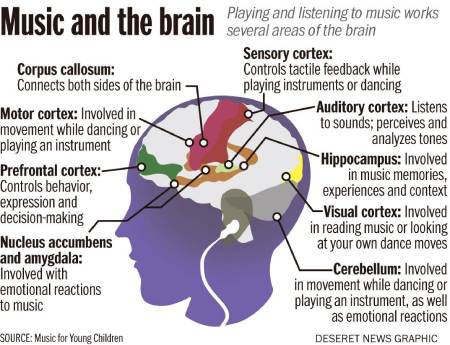Science has shown that music releases mood-enhancing chemicals in our bodies that music therapists can utilize to support medical treatment for patients. One of the ways music affects mood is by stimulating the formation of certain brain chemicals.
Music is may be processed by the amygdala, a part of the brain involved in mood and emotions, but music activates many parts of the brain that are responsible for language, attention, memory, cognition, and movement.
Music can restore cognitive, sensory, and motor function in the brain after traumatic injuries. Studies have shown that music therapy can help the body recover and even reduce pain by releasing endorphins in the body.
Listening to relaxing music after a stressful event can help with depression symptoms, and a 2017 research report concluded that listening to music such as classical music in combination with jazz had a positive effect on depression symptoms after several listening sessions by a certified music therapist.
Music can also help with the psychological aspects of disease and improve the quality of life of patients with cancer, dementia, Parkinson’s, and chronic pain.
How Do Music Therapists Use Music With Patients?
Music acts as a medium for the processing of emotions, trauma, and grief, and can be used as a regulating and calming agent for anxiety and dysregulation. Patients can turn to music to process their emotions differently, write songs to express their feelings or listen to artists with whom they are connected.
Music therapy can be an effective tool for promoting communication in people with various diagnoses, including ASD, stroke, Parkinson’s disease, traumatic brain injury, and more. For example, people diagnosed with aphasia may have suffered a stroke that damaged the part of the brain that controls speech.
Music therapists are trained to respond to the physical, emotional, cognitive, and social needs of their patients with music.

Music therapy is used in palliative care by certified music therapists to improve conventional treatment of a variety of diseases and illnesses: anxiety and depression management, stress management, pain amplification, and function in degenerative neurological disorders.

Researchers have found, by using functional magnetic resonance imaging (fMRI), that listening to music you like increases blood flow to the brain and brain connectivity, even if it’s music that you don’t like.
Research has also shown that the changes in brain wave activity that music brings enable the brain to adjust its own needs so that music can provide lasting benefits to your state of mind long after you hear it.
Can Music Heal A Damaged Brain?
An analysis in 2021 found that music therapy can have positive effects on patients with traumatic brain injuries, including increasing stride length when walking, improving leadership, a mental ability that includes working memory, concentration, attention, and multitasking.
In recent years, neuroscience has provided deeper insights into neurological processes and neurological rehabilitation, which has helped to better understand the effect of music as a stimulus for the brain.
Neurological music therapy has proved to be an effective treatment for people with neurological disorders, and research has shown that music can improve neuroplasticity in the brain.

Examples Of What Music Therapy Can Help
Music therapy has also been found to cause measurable changes in neurotransmitter levels in Alzheimer’s patients, which could be a way to influence their brains.
A 2016 study showed that music therapy can help reduce anxiety and fatigue in cancer patients. A small study in 2002 found that students experienced less anxiety and stress after 20 hours of music therapy and these effects were maintained during a two-month follow-up.
A 2017 review concluded that music therapy reduced patients’ clinical reports of depression, reduced anxiety, and improved the overall functioning of depressed individuals.
Research has also shown that neurological music therapy helps patients with speech and cognitive difficulties and authors suggest that it should become part of rehabilitation treatment.

Summary
Music is processed by the amygdala, a part of the brain involved in mood and emotions. Music therapy has surprising benefits for mental health and can be used as a therapy for both mental and physical rehabilitation.
Additionally, neuroscientists studied how music affects a person’s brain and have found that listening to music you like increases blood flow to the brain and brain connectivity, even if it’s music that you don’t like.
